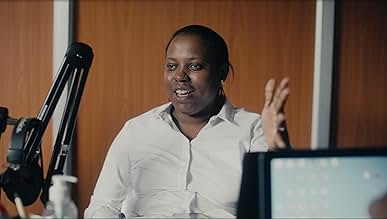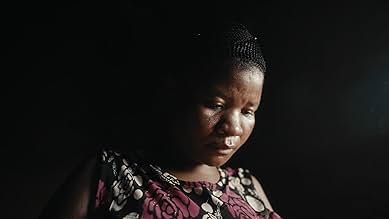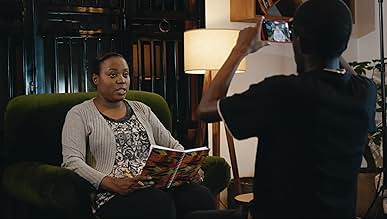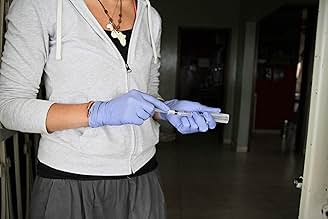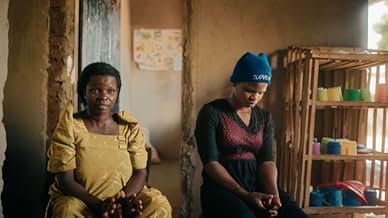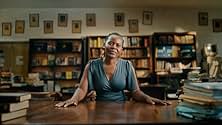Renee Bach è una missionaria americana che ha creato un ente di beneficenza per i bambini malnutriti a Jinja, in Uganda. Ma sono emerse accuse secondo cui Renee curava lei stessa bambini mal... Leggi tuttoRenee Bach è una missionaria americana che ha creato un ente di beneficenza per i bambini malnutriti a Jinja, in Uganda. Ma sono emerse accuse secondo cui Renee curava lei stessa bambini malati, senza avere alcuna qualifica medica.Renee Bach è una missionaria americana che ha creato un ente di beneficenza per i bambini malnutriti a Jinja, in Uganda. Ma sono emerse accuse secondo cui Renee curava lei stessa bambini malati, senza avere alcuna qualifica medica.
- Premi
- 1 candidatura in totale
Sfoglia gli episodi
Recensioni in evidenza
As Episode 1 of "Savior Complex" (2023 release; 3 episodes of about an hour each) opens, we are in Bedford, VA and get to know Renee Bach, a woman in her early 30s who laments she cannot go back to Uganda for reasons that will be revealed soon. Bach grew up in a remote small white Christian community in rural Virginia, and with encouragement from people around her, she decides that her future lies in doing missionary work in Uganda, working with small children that are malnourished if not worse. What could go wrong? At this point we are 10 minutes into Episode 1.
Couple of comments: this is the feature length debut of Jackie Jesko (well known for her work on the hard-hitting news show "Vice"). Here she assesses how it is that a woman in her mid-20s with no medical background or training whatsoever ends up in essence running a medical care facility in Uganda. In the bigger picture, the series also examines the cotton industry that is Christian missionaries all over the world, eager to "help" locals, even though these missionaries aren't in any way qualified, prepared or trained for what they are there for. It feels like colonialism all over again (in the very same way the Catholic church sent out missionaries around the globe in the 16th to 19th century). Beware: there is a fair amount of footage of small children with various ailments that isn't for the faint of heart and that will also break your heart. These 3 episodes just flew by and I found this to be riveting from start to finish.
"Savior Complex" premiered on HBO 2 weeks ago and is also streaming on Max, where I caught it the other night. If you have any interest in the pros and cons of Christian missionary work around the world, I'd readily suggest you check this out, and draw your own conclusion.
Couple of comments: this is the feature length debut of Jackie Jesko (well known for her work on the hard-hitting news show "Vice"). Here she assesses how it is that a woman in her mid-20s with no medical background or training whatsoever ends up in essence running a medical care facility in Uganda. In the bigger picture, the series also examines the cotton industry that is Christian missionaries all over the world, eager to "help" locals, even though these missionaries aren't in any way qualified, prepared or trained for what they are there for. It feels like colonialism all over again (in the very same way the Catholic church sent out missionaries around the globe in the 16th to 19th century). Beware: there is a fair amount of footage of small children with various ailments that isn't for the faint of heart and that will also break your heart. These 3 episodes just flew by and I found this to be riveting from start to finish.
"Savior Complex" premiered on HBO 2 weeks ago and is also streaming on Max, where I caught it the other night. If you have any interest in the pros and cons of Christian missionary work around the world, I'd readily suggest you check this out, and draw your own conclusion.
Watched it, I was expecting something different but what I saw was the same thing we see in America every day. White women tearing other white women down for their own gain. If you have to turn someone else's light out to shine, you don't deserve to have a light. There are morals and then there are decisions made for personal reasons. I will not be supporting any causes made to the Uganda moving forward. If I wanted white women tearing white women down, I could view that in my local church. I am a white woman by the way, Im just tired of it. I would not spend a single dollar to support her predecessors.
It's easy to sit and judge from your comfy American couch, but even when they we're criticizing her, I saw a woman trying to do good. Was it perfect, no. Do I think the documentary gave us the whole truth, no. I very much dislike the nurse, way more than the one who was at least making every attempt.
It's easy to sit and judge from your comfy American couch, but even when they we're criticizing her, I saw a woman trying to do good. Was it perfect, no. Do I think the documentary gave us the whole truth, no. I very much dislike the nurse, way more than the one who was at least making every attempt.
Good intentions, no doubt. Pride and arrogance, absolutely.
What started as an admirable commitment to help feed the poor escalated into deadly self-importance. The step from providing food to becoming a weight-gain facility between the hospital and return home was admirable. Once fund raising secured medical supplies and medicine, things hit a slippery and deadly slope. Good intentions do not bestow medical skills and expertise. Nor do they absolve one from the deadly consequences of practicing medicine without a license.
The NWS group also possesses arrogance. Keen insights on the evils of colonialism and lingering issues during post-colonialism do not absolve the organization of overreach. Volunteers of all stripes are needed in the face of abject poverty and starvation. Yet serving rice and beans is a far cry from pretending to be a doctor. Bach thought her faith made all actions acceptable. She was wrong.
The filmmaker is evenhanded and leaves it to viewers to ponder the larger issues of missionary work, volunteerism, and traveling far to help the poor when they are also in your own community.
What started as an admirable commitment to help feed the poor escalated into deadly self-importance. The step from providing food to becoming a weight-gain facility between the hospital and return home was admirable. Once fund raising secured medical supplies and medicine, things hit a slippery and deadly slope. Good intentions do not bestow medical skills and expertise. Nor do they absolve one from the deadly consequences of practicing medicine without a license.
The NWS group also possesses arrogance. Keen insights on the evils of colonialism and lingering issues during post-colonialism do not absolve the organization of overreach. Volunteers of all stripes are needed in the face of abject poverty and starvation. Yet serving rice and beans is a far cry from pretending to be a doctor. Bach thought her faith made all actions acceptable. She was wrong.
The filmmaker is evenhanded and leaves it to viewers to ponder the larger issues of missionary work, volunteerism, and traveling far to help the poor when they are also in your own community.
Having read the existing reviews, I assumed that this was a story that had been told over and over again - Young white girls are feeling better by visiting Africa. *This is bad*.
And yes, it is, but it has delved into this issue a lot deeper than I expected from a product of the current USA culture wars.
These three episodes attempt (which is more than can be said for a lot of documentaries) to explain its subjects from a number of points of view.
Yes, it is about Africa, and it (without my personal experience) seems to represent its reality, and the reality of the people who live and work there reasonably well.
Yes, it's about US Christianity, and (maybe) presents the (in fairness) admirable traits that drive these missionaries to go to these countries that they have literally no clue about, other than the certain knowledge that the countries are in trouble and need help.
But what are these unspecial, unskilled, people really supposed to be doing (other than evangelising) in a country they know (literally) less than nothing about?
Yes, it is about how countries and cultures view each other (in general terms). If that doesn't interest you, skip it. If you appreciate that we live in an unequal world, but also that we are all humans dealing with global problems, then it is worth a watch (IMHO)
And yes, it is, but it has delved into this issue a lot deeper than I expected from a product of the current USA culture wars.
These three episodes attempt (which is more than can be said for a lot of documentaries) to explain its subjects from a number of points of view.
Yes, it is about Africa, and it (without my personal experience) seems to represent its reality, and the reality of the people who live and work there reasonably well.
Yes, it's about US Christianity, and (maybe) presents the (in fairness) admirable traits that drive these missionaries to go to these countries that they have literally no clue about, other than the certain knowledge that the countries are in trouble and need help.
But what are these unspecial, unskilled, people really supposed to be doing (other than evangelising) in a country they know (literally) less than nothing about?
Yes, it is about how countries and cultures view each other (in general terms). If that doesn't interest you, skip it. If you appreciate that we live in an unequal world, but also that we are all humans dealing with global problems, then it is worth a watch (IMHO)
This documentary is very informative, but not in the way the producers intended.
Most white people would see it and think that they should do better, but instead of listening, they should just watch, understand that you never help and always making a bad situation worse.
Never work against nature, never push the scale of evolution, you are just creating an unbalance with an impact beyond your life and ego.
Africa was in a perfect balance before white aid took hold. Misplaced altruism is always pathological, when you ignore your own tribe, what happens next to you, and go to help people on a different continent, you can be sure you are doing harm.
Most white people would see it and think that they should do better, but instead of listening, they should just watch, understand that you never help and always making a bad situation worse.
Never work against nature, never push the scale of evolution, you are just creating an unbalance with an impact beyond your life and ego.
Africa was in a perfect balance before white aid took hold. Misplaced altruism is always pathological, when you ignore your own tribe, what happens next to you, and go to help people on a different continent, you can be sure you are doing harm.
I più visti
Accedi per valutare e creare un elenco di titoli salvati per ottenere consigli personalizzati
Dettagli
- Tempo di esecuzione
- 1h(60 min)
- Colore
Contribuisci a questa pagina
Suggerisci una modifica o aggiungi i contenuti mancanti


